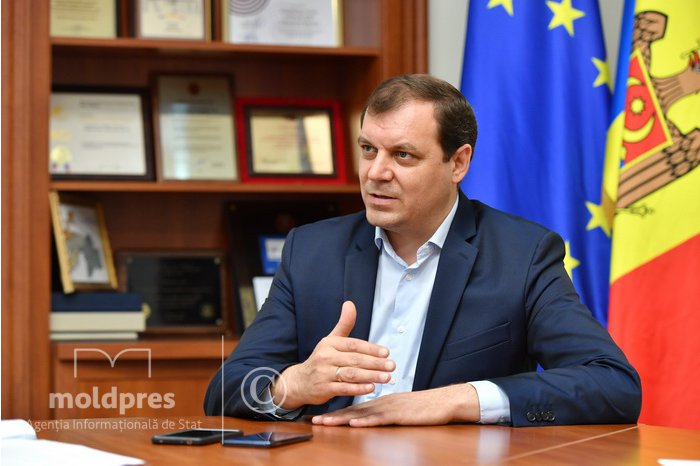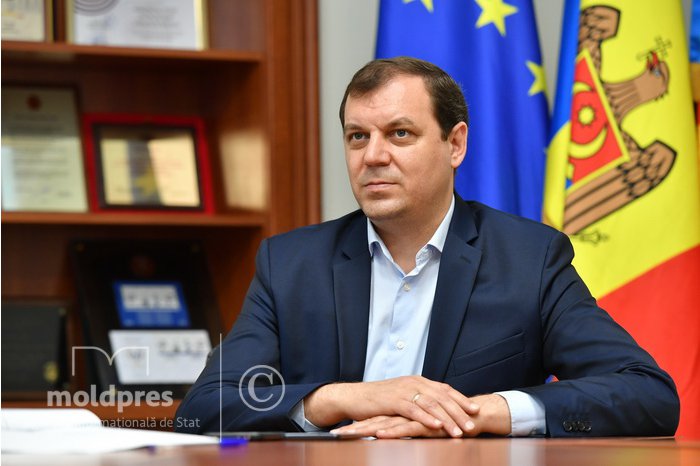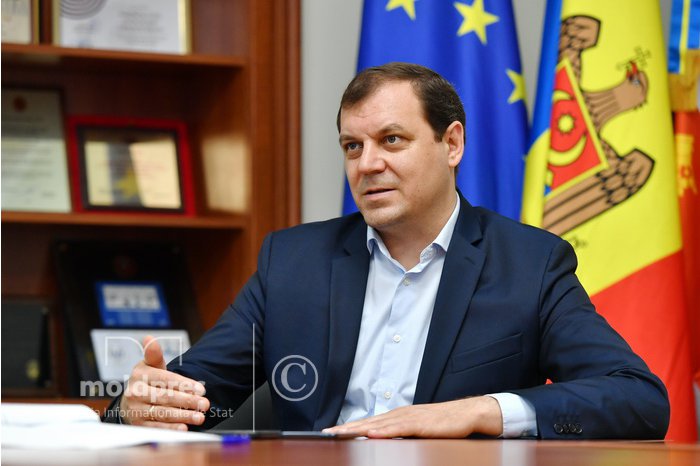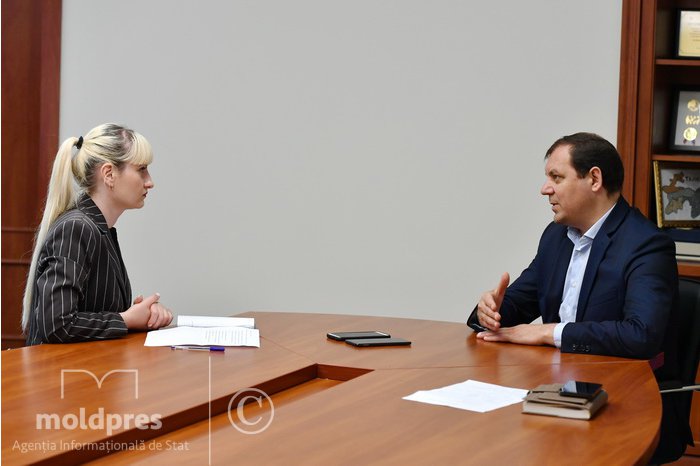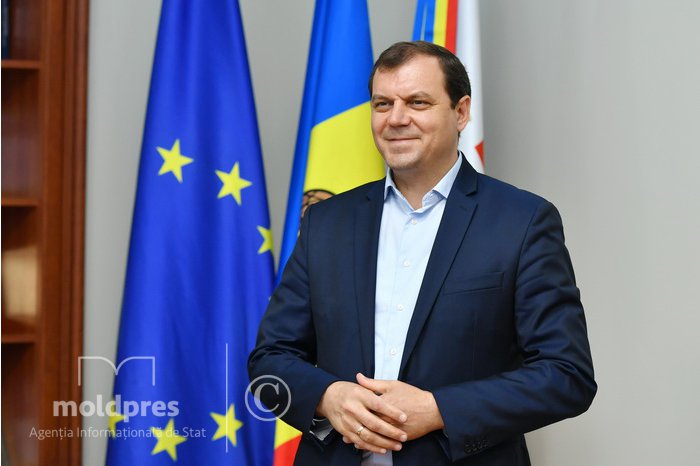Rector of Stefan cel Mare Academy says he is proud of students, appreciates courage, self-denial
11:35 | 21.06.2023 Category: Interview, Event
Chisinau, 20 June /MOLDPRES/ - Rector of the Stefan cel Mare Academy Dinu Ostavciuc has given an interview exclusively with the MOLDPRES State News Agency, in which he referred to the work of the institution, educational offer for the next academic years, opportunities of education and the employment in the internal affairs system.
MOLDPRES: The Stefan cel Mare Academy of the Interior Ministry (MAI) was founded 32 years ago. On this period, the institution’s teachers have educated staff both for the MAI system and for other state bodies. How the institution’s activity has evolved, in the context of the changes in the internal affairs system?
Dinu Ostavciuc: The Stefan cel Mare Academy has always been in the service of the Interior Ministry or the latter is actually the founder of the institution. During years, the Academy adjusted its activity depending on MAI’s needs, including in the maintenance of the public order and combating the criminality. Thus, with the legislative, geopolitical changes and the ones in the society, the Academy’s employees always complied with the requirements and coped with the problems, in order to educate qualified staff for MAI. The Academy has always had the Law Faculty, which was eligible for more offices from MAI – criminal prosecution officer, investigations officer, specialists criminalists, specialists in the public order and safety. Subsequently, the need to create new syllabi appeared. Thus, starting from 2019, with MAI’s reform, along with the team, I was set to create new syllabi, in order to keep pace with the time and the requirements. This year, we submitted the acts for two new syllabi: border security and civilian security, and public order, conditioned including by the situation in Ukraine, including by the migration flow. At the same time, we have temporary authorization for the public administration syllabus. Besides the basic syllabi, we have syllabi of initial and continuous training. After the finishing of the education, the graduates are welcome into the system; they have opportunity to be employed also in the subdivisions of MAI’s central apparatus. In the last years, the Academy has become more and more attractive among girls and we have quite well-trained young women. The young people ruling to study at the Stefan cel Mare Academy are true patriots, who care about the social safety. I am proud of our students; I appreciate their courage and self-denial. We often meet graduates, who say that, besides education, team work predominates here, equal conditions for living, the wearing of uniforms by everybody, as well as the formation of a life-long friendship. I am also a graduate of the Academy and I do not regret the decision, as there is discipline and possibility to create a successful career here. More than 2,000 trainings – initial and continuous training – annually take place at the institution at present.
MOLDPRES: Which is the educational offer for the next academic year?
Dinu Ostavciuc: We have four syllabi at the first degree cycle: Law, Border Security, Civilian Security and Public Order, as well as Public Administration. The registration takes place with budgetary financing and under contract. At the same time, seven syllabi are proposed for the master education: Economic law, criminal law, criminal prosecution, Migration and Asylum, police law, contravention law and special investigation activity. The Migration and Asylum syllabus was launched this year, including following the flow of refugees.
There are 175 places with budgetary financing for this academic year and the number of registration under contract, about 120 young people, is ruled through a decision taken by the Senate. In the last years, the tendency of education under contract has been on the rise. The sum of the contract is of about 11,000 lei. The admission will start with the reception of the Baccalaureate diplomas. The Academy and all inspectorates from Moldova are prepared to receive the applications and prepare the file of the candidates. At the same time, young people can download the acts needed also at distance, through a platform. Subsequently, they will come to the psychological and medical examinations. The physical exam is not compulsory; the important thing is that the person is healthy from the medical viewpoint and he/she is to get the physical education during the academic years.
MOLDPRES: Which are the conditions for education provided to young people?
Dinu Ostavciuc: The students are free to choose where to study; the libraries work according to a special schedule. At the same time, the information material is downloaded on electronic platform, in order to be able to study at any time, including online. The lecture rooms and the laboratories are repaired and endowed. The sports halls are modern, young people have a football field as well. We have a fully repaired canteen and endowed with modern equipment. The way of students’ nourishment was changed; we have meat, fish, fresh vegetables and fruits in the menu. The opportunities enjoyed by the students are quite great, including the free of charge accommodation. Repair works were carried out in barracks, the students have all commodities and technology needed, such as washing machines or pressing irons. At the same time, they have also resting rooms. The largest sum of money for the works carried out is from the country’s budget – provided by MAI, followed by the U.S. Embassy in Moldova and the United Nations Development Programme (UNDP).
MOLDPRES: What opportunities of employment do young people have after the finishing of the education?
Dinu Ostavciuc: The Interior Ministry makes available guaranteed jobs to our students. During the distribution, colleagues from human resources provide the graduates with opportunities of employment and they can opt for the future job. This is a quite great advantage for the graduates. At the same time, the young people can start working also at the MAI’s central apparatus. Also, over 30 per cent of the students are employed at the National Anticorruption Centre (CNA), Intelligence and Security Service (SIS) or penitentiary institutions. Our graduates are quite well-quoted, I am proud of them much.
MOLDPRES: Which is the perspective of the institution’s development, in the context of the getting of the status of country candidate for accession to EU?
Dinu Ostavciuc: The Interior Ministry and the Stefan cel Mare Academy provided for these things through the perspective of the quality of education. The syllabi as regards the police aspect were worked out through a Twinning project. The curriculum resembles the one in Poland, Lithuania and Romania. At the same time, we have already achieved the European educational standard. We do not stop here; our students participate in diverse academic mobilities, including Erasmus+. We also hold negotiations and have mobilities with counterpart education institutions, for instance the Alexandru Ioan Cuza Police Academy from Bucharest. Also, the academic mobility takes place among teachers as well. At the same time, we can mention that the degree syllabus – Law and three master syllabi, were accredited by the Romanian Agency for Quality Assurance in Higher Education (ARACIS), which gave us the largest number of points. We are already in Europe from the educational viewpoint. To overcome the linguistic difficulties, a department was set up at the Academy, which deals with the training of MAI students and staff. The foreign partners regard us with potential at the carrying out of the exchange of good practices on certain subjects and are quite receptive in the field of the inter-university cooperation. They are willing to back us, in order to improve the quality of trainings. At the same time, our institution is also prepared to share the experience gained, in the context of the significant challenges at the country’s border. We have many sectors and subjects to be shared with colleagues from abroad. The education has no border. In this respect, we enjoy a major support on behalf of MAI and this makes us stronger. I am personally a graduate of the Academy; I was trained here as man, officer and patriot. I made here the master and doctor’s education. It is an honour for me to be at the head of the Stefan cel Mare Academy; along with the colleagues, we work with self-denial day after day for training the future specialists in accordance with the society’s expectation. We have highly qualified staff, with scientific titles; they represent the image of the institution. In the next years, I see the Academy as a modernized institution, which will train specialists according to the latest international standards. At the same time, emphasis will be put also on the consolidation of the international relations, on the mutual exchange of information in the scientific activity and of other education projects of common interest, for the benefit of the society.
MOLDPRES: Thank you for the kindness to give this interview with our agency.
